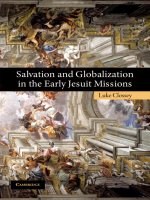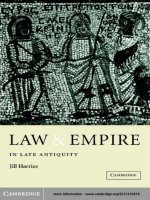0521847427 cambridge university press statius and epic games sport politics and poetics in the thebaid may 2005
Bạn đang xem bản rút gọn của tài liệu. Xem và tải ngay bản đầy đủ của tài liệu tại đây (1.19 MB, 0 trang )
Statius and Epic Games
Epic games are more than just an interlude; they reflect the realities of epic:
heroism, power and war. This first major study of the athletic games in Statius’
Thebaid Book 6 uses them to produce a new reading of the poem as a whole.
It explores each event in Statius’ games, discussing intertextual manoeuvres,
historical context and poetic positioning, developing a theme from each: audience
power, cosmic disruption, national identity, masculinity and the body, games and
war, kingship and narrative control. This book uses a close reading of one part of
one text to range over ancient literature. It casts light on the tradition of games in
ancient epic as a whole, examining the works of Homer, Virgil, Apollonius, Ovid
and Lucan. It is essential reading for the student of Statius and of ancient epic,
and should also appeal to historians of Roman society with an interest in sport
and spectacle.
h e l e n l o v a t t is Lecturer in Classics at the University of Nottingham. She
has written numerous articles on Latin epic and its reception.
cambridge classical studies
General editors
r. l. hunter, r. g. osborne, m. d. reeve,
p. d. a. garnsey, m. millett, d. n. sedley,
g. c. horrocks
STATIUS AND EPIC GAMES
Sport, Politics and Poetics in the Thebaid
HELEN LOVATT
University of Nottingham
cambridge university press
Cambridge, New York, Melbourne, Madrid, Cape Town, Singapore, São Paulo
Cambridge University Press
The Edinburgh Building, Cambridge cb2 2ru, UK
Published in the United States of America by Cambridge University Press, New York
www.cambridge.org
Information on this title: www.cambridge.org/9780521847421
© Faculty of Classics, University of Cambridge 2005.
This book is in copyright. Subject to statutory exception and to the provision of
relevant collective licensing agreements, no reproduction of any part may take place
without the written permission of Cambridge University Press.
First published in print format 2005
isbn-13
isbn-10
978-0-511-11155-6 eBook (NetLibrary)
0-511-11155-x eBook (NetLibrary)
isbn-13
isbn-10
978-0-521-84742-1 hardback
0-521-84742-7 hardback
Cambridge University Press has no responsibility for the persistence or accuracy of
urls for external or third-party internet websites referred to in this book, and does not
guarantee that any content on such websites is, or will remain, accurate or appropriate.
To those who help make the possible into reality.
The board became both Culture and Empire again. The setting was made by them
both; a glorious, beautiful, deadly killing field, unsurpassably fine and sweet
and predatory and carved from Nicosar’s beliefs and his together. Image of their
minds; a hologram of pure coherence, burning like a standing wave of fire across
the board, a perfect map of the landscapes of thought and faith within their heads.
He began the slow move that was defeat and victory together before he even
knew it himself. Nothing so subtle, so complex, so beautiful had ever been seen
on an Azad board. He believed that; he knew that. He would make it the truth.
The game went on.
Breaks, days, evenings, conversations, meals; they came and went in another
dimension; a monochrome thing, a flat, grainy image. He was somewhere else
entirely. Another dimension, another image. His skull was a blister with a board
inside it, his outside self just another piece to be shuffled here and there.
He didn’t talk to Nicosar, but they conversed, they carried out the most
exquisitely textured exchange of mood and feeling through those pieces which
they moved and were moved by; a song, a dance, a perfect poem. People filled the
game-room every day now, engrossed in the fabulously perplexing work taking
shape before them; trying to read that poem, see deeper into this moving picture,
listen to the symphony, touch this living sculpture, and so understand it.
Iain M. Banks, The Player of Games
CONTENTS
Acknowledgements
List of abbreviations
page x
xii
Introduction
1
1. The chariot race
23
Epic games and real games
40
2. The running
55
Audiences
80
3. The discus
101
Gigantomachy
114
4. The boxing
141
National identity
166
5. The wrestling
193
Bodies
219
6. The sword fight
243
Games and war
257
7. The archery
277
Controlling the narrative
285
Conclusion
Appendix: summary of epic games
Bibliography
Index of passages discussed
General index
ix
307
311
317
331
334
AC K N OW L E D G E M E N T S
This has been a very long project; since I first started working on
Statius in 1995, until the final revision of the Ph. D. thesis in 2003,
so many people have helped me and continue to help me. Michael
Sharp, Annie Lovett and Sin´ead Moloney provided podiums and
victory palms; the sharp eyes of Nina Palmer saved me from many a
stumble; Carrie Vout, Helen Asquith, Sara Owen and Jason K¨onig
helped me down the home straight; friends and colleagues at New
Hall, Keele and Nottingham supported and commiserated. My
sponsors, without whom I would never have made it to the games,
were New Hall for the research fellowship which gave me the time
to carry out revisions and the confidence to try, and the AHRB
for financial support during M. Phil. and Ph. D. Many generations
of friends in the Cambridge Classics Faculty Graduate Common
Room cheered on the sidelines; Emily Greenwood, Lucy Grig and
Jason K¨onig struggled heroically with my thesis. Thanks also to
Joanne Brown, Ruth Parkes, Philip Smith, Jason K¨onig, Andrew
Feldherr and Alison Sharrock for giving me things to read. Now to
those who coached and trained: Damien Nelis, my Ph. D. examiner,
gave enthusiasm and details with great generosity; Elaine Fantham
gave timely encouragement and a clear-minded overview. Michael
Reeve, read (and reread), helped and supported; Richard Hunter,
without whose encouragement I would never have even attempted
this; Philip Hardie, for raising eyebrows and putting up with me
over the years; John Henderson, my supervisor, who knew when to
leave well alone and when to intervene, and who never encouraged
me to take any sort of illegal substances in pursuit of better performance. Back to grass roots in the palaestra, thanks to all those
teachers who started me off in the right direction: Neil Wright,
who first read Statius with me, and especially Roger Adams, who
spent the most enthusiastic hour and a half reading four lines of
the Aeneid that I have ever encountered. Support on the home front
x
acknowledgements
came from: Andrew’s parents, who looked after Jonathan (and me)
when we needed help; my parents and sister, who coped with my
endless obsessions; last, and most importantly, Andrew, for tending to me, fixing computer problems, providing moral support and
a sense of proportion, and Jonathan, for making it all worthwhile.
A large but inevitably inadequate thank-you to you all. Any errors,
omissions or other horrors that remain are my own responsibility.
The text of the Thebaid used is that of Hill (1983); all translations
are my own and attempt only to explain how I read the Latin, with
no pretensions to the status of literature. The extract from The
Player of Games by Iain M. Banks is reproduced by permission of
Time Warner Books (London, 1996).
xi
A B B R E V I AT I O N S
CHCL
Lewis and Short
LSJ
OLD
RE
SH
TGF
TLL
E. J. Kenney and W. V. Clausen, eds. (1982)
Cambridge History of Classical Literature
II. Latin Literature, Cambridge
C. T. Lewis and C. Short (1879) A Latin Dictionary, Oxford
H. G. Liddell and R. Scott, rev. S. Jones
(1925–40) Greek English Lexicon (9th ed.),
Oxford
(1968) Oxford Latin Dictionary, Oxford
A. Pauly, G. Wissowa and W. Kroll (1893– )
Real-Encyclop¨adie der klassischen Altertumswissenschaft, Stuttgart
H. Lloyd-Jones and P. Parsons, eds. (1983),
Supplementum Hellenisticum, Berlin; New
York
A. Nauck, ed. (1926) Tragicorum Graecorum Fragmenta (2nd ed.), Leipzig
(1894– ) Thesaurus Linguae Latinae,
Leipzig
xii
I N T RO D U C T I O N
nil fixum cordi: pugnant exire pauentque,
concurrit summos animosum frigus in artus.
qui dominis idem ardor equis; face lumina surgunt,
ora sonant morsu, spumisque et sanguine ferrum
uritur, impulsi nequeunt obsistere postes,
claustraque compressae transfumat anhelitus irae.
stare adeo miserum est, pereunt uestigia mille
ante fugam, absentemque ferit grauis ungula campum.
circumstant fidi, nexusque et torta iubarum
expediunt firmantque animos et plurima monstrant.
insonuit contra Tyrrhenum murmur, et omnes
exsiluere loco. quae tantum carbasa ponto,
quae bello sic tela uolant, quae nubila caelo?
amnibus hibernis minor est, minor impetus igni,
tardius astra cadunt, glomerantur tardius imbres,
tardius e summo decurrunt flumina monte.
(Thebaid 6.394–409)
Nothing is fixed in their hearts: they fight to get out and they fear,
a spirited shiver runs through to the tips of their limbs.
In the masters, in the horses, the same burning; their eyes shoot flame,
their mouths sound with biting, the iron is burnt with foam
and blood, the posts cannot stand in their way as they push
against them, breath of compressed anger smokes across the bolts.
To stand is so wretched that a thousand footsteps perish
before their flight, the heavy hoof is striking the absent plain.
The faithful stand around, sorting out reins and the twisted
crests, strengthening spirits and offering much advice.
The trumpet blast sounded opposite, and all
leapt out from their places; what sail on the sea,
what weapon in war flies so fast, what cloud in the sky?
The force of the winter floods is less, the force of fire is less,
more slowly fall the stars, the rain storms gather more slowly,
more slowly from the mountain-top torrents run down.
1
statius and epic games
Start at the beginning, in medias res, in the middle of the beginning,
in this case with the beginning of Statius’ first event, the chariot
race: the reader is drawn into the fever-pitch excitement of the
racehorses straining to explode from the gates, just as the viewer
shares the tension waiting for the starting gun to fire. All polarities
become paradoxes: master and horse are in one state of mixed
excitement and terror; cold mixes with fire; metal burns; breath
becomes smoke. The horses and their riders already race the course
in their minds, as if caught up in an endless repetition of the act
before it even happens. The gun fires; the handkerchief falls; the
trumpet blasts: the speed and force of the chariots bursting out, the
thunder of horses’ hooves, becomes a flood of thundering images,
thumping the message home.
We too will play out our own set of games, each chapter an
event, each event a chapter. The line between audience and competitors will not necessarily be clear: you are watching me; we are
watching Statius; we are watching Statius watch his competitors
and their audience; those competitors are watching each other. Will
you compete by reading – making a judgement and running your
interpretations against mine? It should prove a game worth playing, a spectacle worth watching; perhaps we will be in luck – and
catch a spectacular shipwreck, or a controversial verdict or two:
no disqualifications, I trust.
This is a book about Statius and about epic games.1 It rereads
Statius and the Thebaid through a reading of the games in book
6 and their interaction with the rest of the poem.2 It rereads epic
games from the vantage point of Statius, looking back over all
his epic predecessors (and interacting with his contemporaries).3
1
2
3
Work on Statius’ epic games has generally followed two lines: the relationship between
Statius’ games and those of Homer and Virgil, and the relationship between Statius’ games
and Roman games. Legras (1905) deals with both, as does Von Stosch (1968) (the only
monograph on the subject); Kytzler (1968) concentrates on Virgil and Homer, as does
Juhnke (1972); Thuillier (1996b) studies Statius as evidence for historical games. Venini
(1961a) introduces a new element with her investigation of foreshadowing, elaborated by
Vessey (1970): the relationship between the games and the rest of the poem.
The title of the book refers to the title of Michael Putnam’s chapter on the games in Aeneid
5 ‘Game and Reality’: he reads Virgil’s games as a light-hearted version of the serious
events to come, primarily the sacrifice of Palinurus (Putnam (1965) 64–104).
Silius Italicus also wrote a set of games, in Punica 16; Juhnke (1972) 229–67 analyses both sets of games. Throughout the book I have attempted to give a sense of the
similarities and differences, but I explore the relationship fully elsewhere. Scholarship
2
introduction
It is a book about both intratextuality and intertextuality. Each
chapter comes in two halves: the first half is mainly intertextual;
each reads one event in the games in detail, looking at the relationships with previous versions; the second half is intratextual,
taking a theme from the event and tracing it through the rest of the
Thebaid. Starting from close reading of a small part of one poem,
we move out towards wider interpretation of the whole poem, a
sense of the poem’s interaction with its genre and predecessors,4
a new perspective on that genre and on wider issues in Greek and
Roman culture.5 The poetics of athletics meets the poetics of gigantomachy; games are played on and through bodies and audiences;
the tripartite power structure of editor (producer of the games),
audience and spectacle forms one frame for the discussion; the
construction of masculinity, ethnicity and poetic identity another.
Anyone interested in Statius, epic games, the epic genre in any of
its incarnations, ancient or otherwise, anyone interested in representations of sport and the history of games, will find something
to watch.6
In this introduction, I present Roman ideas about games, examining the ludic through the multifaceted concept of ludus. It is
also a prelude, a pompa, bringing in the characters who will watch
4
5
6
has generally placed the publication of the Punica after the publication of the Thebaid,
though acknowledging that the process of composition would have overlapped and that
reciprocal influence is probable. See Wistrand (1956); Venini (1970a) xv–xvi; Juhnke
(1972) 12–13; Dewar (1991) xxxi–xxxv; Smolenaars (1994) xvii–xviii.
Hardie (1993) shows that Statius is a reader and critic of Virgil, as well as a successor.
Cf. Hinds (1998) on Statius and ‘secondariness’.
The foundation of my work is an attempt to read and understand the text under consideration: I chose the themes from what I found interesting, disconcerting and difficult in the
text. There will be a running dialogue between close reading and broad theory, in which
each changes the other. I mean to combine discovery of what is there already in the text
with new ideas and new readings of it.
Apology has characterised scholarship on Statius: each generation of apologists creates a
defence for studying Statius which becomes the object of attack for the next generation. So
the label of ‘episodic epic’ which started as an apology became a means of criticising and
marginalising Statius’ Thebaid, effectively repudiated by Vessey (Vessey (1970); Vessey
(1973); Brown (1994) 6). Vessey’s apology centred around the concepts of ‘mannerism’
and ‘baroque epic’: Ahl has laid bare the persistent rhetoric of marginalisation in these
concepts too (Ahl (1986) 2809–10). It is no empty rhetorical stance, then, when I refuse to
apologise for working on Statius. Statius can and should be central to our understanding
of ancient epic, and critical work on the Thebaid can start from the position that the aim
is elaboration and enrichment of understanding, not justification of the poem itself. The
extent to which I am indebted to previous work on Statius is clear from the whole text,
though it will not be possible to acknowledge these debts in full.
3
statius and epic games
throughout, under the auspices of the Olympian gods watching
from their box. Exploration of the poetics of epic games will begin
by examining games as ‘prelude’, and the imagery of games in
Statian recusatio. Finally, I want to provide background for the
events to come (think of it as the thirty days’ training, presided
over by the hellanodikai). What was the system of spectacle in
Rome? What are the fundamental dynamics of intertextuality in
Statius’ games? How does the programme of a set of epic games
conjure up a different world?
Concepts of games
In this section, I briefly examine the concepts associated with the
Latin noun ludus (game) and verb ludo (I play); how similar are
Roman concepts of games to our own? How do epic poets in particular refer to their games? The TLL gives us a baseline for the
concept: a ludus is fundamentally in opposition to whatever is
serius (‘serious’), and to labor (‘work’). This fits in very well with
our ideas about games, encapsulated in the phrase ‘just a game’.
Essentially, a game is always something which is set against some
sort of reality (though it might be asked whose reality). This study
is concerned with the different realities against which Statius sets
his games.
Playing is also used of spending one’s time idly or frivolously,
even wasting one’s efforts; there is a hint of disapproval in the
way the concept is transferred to other ideas, which suggests that
a game in the Roman mind is not only ‘just a game’, something to be dismissed as unimportant, but even something slightly
immoral. To play with someone is not only to tease, but also
to ridicule, make mock of, and even to trick or deceive. To act
towards someone with less than perfect seriousness is to wound
their dignity and even, perhaps, to damage the truth. If anything,
the Roman attitude towards games is even more derogatory than
our own. It is not surprising, then, that epic games have generally been despised as ‘mere decoration’, and have often been
neglected.
4
introduction
The ludus is the activity of a child or an animal, not an adult. The
difference between boyhood and manhood for Parthenopaeus, for
instance, is the difference between games and war. The problems
of defining the reality of adult masculinity will recur, most importantly in chapter 5. Of speaking, ludus refers to whatever is said
without seriousness, to jokes and jests. It is even used of writing
poetry which is less than totally serious. The game of poetry and
poetry as games will be an important theme throughout this book:
the chapter on the wrestling, for instance, reads the match as a
metaphor for intertextual competition; the chariot race also evokes
ideas about the chariot of song.
The concept also contains ideas of practice and learning:
the noun ludus, in a way which is completely foreign to the
English word ‘game’, came to refer to schools for children (ludus
litterarum) and even places of training, like the gladiatorial school.7
The game in this sense is equated with practice in opposition to
doing something for real. The idea of fun or recreation does not
always seem to come into it. This crucial difference between practice and reality is the key moment in the discus.
Ludi in the plural, like our ‘games’, is used primarily to refer to
‘a set or festival of public games’ (OLD), often with an epithet (e.g.
Ludi Romani, or, for instance, ‘Olympic Games’). Although this
word is used more strictly for Roman contests held in the circus or
theatre (circenses or scaenici) in opposition to, for instance, gladiatorial munera, it was also used to describe festivals of Greek games,
including athletics and musical competitions. For instance, Domitian’s Capitoline games, at which Statius competed unsuccessfully,
are usually referred to as Ludi Capitolini.8 Isidore, writing about
the origin of the word, offers a useful retrospective summary:
7
8
For McDonnell (2003) 243, Plautus’ use of ludus to mean school (Rudens 43) is linguistic
borrowing from the Greek scol, which naturally refers to both ‘leisure’ and ‘school’.
Statius’ use of ludus to describe his games could be a self-consciously Greek borrowing, like Siluae, used to mean ‘material’, from the Greek Ìlh, another of McDonnell’s
examples.
Plautus refers to ludos Olympios in the Stichus (306); other references to the Olympic
Games as ludi: Plautus Casina 759–63; Cicero De oratore 3.127; De natura deorum 2.6;
Pliny Naturalis historia 4.15; 7.205; Servius on Georgics 3.19 (though he also uses the
word agon); Velleius Paterculus 1.8.1 (also ludicrum); Livy 27.35.3 and 28.7.14 refers to
them as a ludicrum.
5
statius and epic games
‘a ludus can be athletic, in the circus, gladiatorial, or in the theatre’ (ludus autem aut gymnicus est, aut circensis, aut gladiatorius,
aut scaenicus, Isidore Origines 18.16.3). Thus ludi, and Statius’
games as ludi, combine two aspects of games: they are a public
spectacle, a show put on for the entertainment of the audience, and
the spectacle itself is sport, a sort of game. They are games and a
game, ludic both for audience and competitors.
So much for Roman concepts of ludi in general; next, to consider
the way that epic poets talk about their games. When Statius refers
to his games, he has a variety of names for them. Virgil refers to his
games throughout as either ludi (‘games’, Aeneid 5.113, 605) or
certamina (‘contests’, Aeneid 5.545, 695), Silius as ludi (‘games’,
16.579), certamina (‘contests’, 16.312, 457, 527) or spectacula
(‘spectacles’, 16.531, 557). Silius’ gladiatorial fights are spectacles, and Statius too uses this word of the boxing match (et erecto
timeat spectacula uoto, ‘and each man fears the spectacle with
tense prayers’, 6.759). These events in particular are spectacular
because of their danger: the pleasure of watching games is like
the pleasure of reading epic.9 Statius alone calls his spectacle ‘a
game’ (ludus).10 But what does this imply? Ludus has a quite different range of meaning from ludi.11 Perhaps the point is that this
is both a moment of play for the epic poet, a display less serious
than the war to come, and also a preparation, a training for heroes
and readers in the realities of epic and war. Alternatively, since
the second reference is followed (6.5–14) by descriptions of the
founding of the other three sets of games on the Greek periodos
(Olympic, Pythian and Isthmian), perhaps the singular use of ludus
distinguishes the games from Roman-style festivals and points to
their alien status, in a similar way to Livy’s description of them as
a ludicrum (a show, public games). The phrase Graium ex more
decus, used of Statius’ games at the beginning of book 6, (‘a traditional Greek celebration’, 6.5) certainly emphasises the Greek
context and heritage. The interplay between Greek and Roman is
9
10
11
In a forthcoming project on The Epic Gaze, I shall investigate in more detail the spectacle
of epic battle and death, and the particular ways in which epic views its heroes and events.
At the beginning of the Nemean excursus (4.729) and at the beginning of the book of
games (6.3).
Virgil uses ludi to refer to Greek-style athletic games at Georgics 2.381 and at Aeneid
5.113.
6
introduction
a particularly fraught Statian issue, and one which will continually
return to haunt us, taking centre stage in the boxing. Later on in
the games, Statius also uses ludus in the singular to refer to one
particular event, when Phlegyas of Pisa is preparing for the discus:
hic semper | amori ludus erat (‘This game was always his love’,
Thebaid 6.673–4). The discus is almost the emblem of Greek athletics, part of the pentathlon, and this event in particular is more
of a sport than a contest. This is Phlegyas’ hobby, in the same way
that Tydeus wrestles in his leisure time (sic otia Martis | degere,
‘thus he spent his leisure from war’, Thebaid 6.830–31).
The relationship between games and war is particularly important in Statius, who frequently and characteristically describes his
games as naked or unarmed battles.12 Neither Virgil nor Silius
uses this term. The most commonly used word for Greek games
is certamina, which blurs the boundary between contest and fight.
But Statius takes this further. When Jupiter is chastising Mars for
allowing this huge delay, he underscores the god of war’s failure by
ironically describing the discus and boxing in warlike terms: sonat
orbe recusso | discus et Oebalii coeunt in proelia caestus (‘The discus sounds with its sphere reverberating and Spartan boxers join
battle’, 7.20–21). Jupiter brings out the distance between games
and war by underlining the similarities: this is the best we can manage, he seems to suggest. I asked you to overthrow the world and
only the sphere of the discus is crashing about us; the only battles
you can manage are boxing matches.
This lexical survey of the way that Roman epic poets refer to
their games brings out the different meanings and functions of
epic games. Epic games work against the reality of epic war, but
the representation of epic games as games is not uncomplicated.
Reality intrudes on the games, and the games become reality. In
particular, Statius represents his games as work. He describes them
as labor, and they can also be an opus.13 Just as poetry can be a game
in contrast to the reality of Roman or modern political life, while
the body of a poet’s writings in Latin as in English can be ‘works’
(opera), so athletics were and are both work and play. The interplay
between games and their various realities works both ways: games
12
Thebaid 6.18, 249; 7.91.
13
labor: 6.469, 503, 796, 924–5; opus: 6.643, 668.
7
statius and epic games
are always in opposition to and read against war, work, the world,
the body; spectators watch competitors; readers read texts. On the
other hand, games represent and articulate the realities from which
they are marked off; spectators identify with competitors; the circus
becomes the cosmos; the reader is within the text.
Prelude
Poetry, as we have seen above, can be ‘just a game’. In this section,
I explore the poetics of playing and look at the way that Statius suggests that his games are a prelude to serious epic, just as the Siluae
are a prelude to writing in a serious genre, and as mythological epic
is a prelude to writing the serious historical and panegyrical epic of
Domitian’s great deeds.14 I want to begin with an example of poetic
games from Statius’ contemporary, Martial.15 In the proem to his
Apophoreta, Martial refuses to write a Thebaid: uis scribam Thebas Troiamue malasue Mycenas? | ‘lude’ inquis ‘nucibus’: perdere
nolo nuces. (‘You want me to write about Thebes, Troy or Mycenean tragedies? “Play with nuts!” you say, but I refuse to waste my
nuts.’ Martial 14.1.11–12.) Martial’s interlocutor exhorts him to
gamble with nuts rather than writing trifles in the Catullan fashion:
don’t write nuts, play with them. Martial then claims that playing
is serious business: he doesn’t want to risk losing his trifles. This is
set against the background of epic as serious poetry while epigram
is play. Perhaps to write an epic is to gamble for stakes too high:
writing epic, for Martial, is deep play.
The Virgilian Culex uses playing of writing less serious poetry:
lusimus, Octaui, gracili modulante Thalia (‘We have played,
Octavius, with slender Thalia directing’, Culex 1). Statius, in his
prose preface to Siluae 1, uses the Culex as an equivalent of the
Siluae, a game played before serious poetry: quid enim [. . .]quoque
auctoritatis editionis onerari, quo adhuc pro Thebaide meo timeo?
14
15
Ruurd Nauta in an excellent paper on ‘The Recusatio in Flavian Poetry’, Groningen
Colloquium on Flavian Poetry, 2003, covered much of this material, but the emphasis
on poetry as a game is my own addition.
For this Martial moment, I thank Sarah Culpeper Stroup in her paper ‘Invaluable Collections: The Illusion of Poetic Presence in Martial’s Xenia and Apophoreta’ at the
Groningen Colloquium on Flavian Poetry, 2003.
8
introduction
sed et Culicem legimus et Batrachomachiam etiam agnoscimus,
nec quisquam est inlustrium poetarum qui non aliquid operibus
suis stilo remissiore praeluserit. (‘For why [should they too] be
weighed down with the authority of publication, when I am still
afraid on behalf of my Thebaid? But we read the Culex too, and
we even recognise the Batrachomachia, and there isn’t a single one
of the famous poets who didn’t make some sort of foreplay for his
greater works with a more relaxed pen.’ Statius Siluae 1.Preface.5–
9.) This makes the Virgilian and Homeric model for the poetic
career override reality, suggesting that lighter genres are inevitably
earlier than heavier ones, even though in this very passage he represents the Thebaid as already published. The same word (praeludo)
is used in the proem of the Achilleid in Statius’ bid to postpone
indefinitely the imperial requirement to write an epic in Domitian’s
praise (Achilleid 1.14–20):
at tu, quem longe primum stupet Itala uirtus
Graiaque, cui geminae florent uatumque ducumque
certatim laurus (olim dolet altera uinci),
da ueniam ac trepidum patere hoc sudare parumper
puluere: te longo necdum fidente paratu
molimur magnusque tibi praeludit Achilles.
But you, who first above all stupefied both the Italian and Greek
heroes, for whom the twin wreaths of poet and leader
flourish in rivalry (already one regrets being conquered),
pardon me and allow me in my fear to sweat in this dust
for a little longer: I am not yet confident in my preparations
to work on you and great Achilles is a prelude to you.
The Achilleid is a prelude to an epic on Domitian, a game played
before the real work of historical epic and panegyric. Statius brings
out the idea of writing as a game with the imagery of sweating in
the dust, which refers to the beginning of our epic games, where
the games literally ‘foresweat’ the war (praesudare, 6.4). In Siluae
4.4, the poet also uses an image from the beginning of Thebaid
6, the image of the ship training for the real sea (6.19–24), in a
recusatio for not writing about Domitian: fluctus an sueta minores |
nosse ratis nondum Ioniis credenda periclis? (‘Should my ship,
accustomed to knowing lesser waves, not yet be trusted to the
dangers of the Ionian?’ Siluae 4.4.99–100.) The Siluae are games
9
statius and epic games
to epic’s war; mythological epic is equally a game in comparison
to the true labour of historical panegyric. Statius always leaves the
real writing until later; through the mask of ‘just a game’ he hides
the seriousness of playing.
A very brief history of Roman games
I want now to move to background and historical games. The origins of Roman ludi are a prime site for legend and tendentious narrative.16 Virgil creates a role for Aeneas, Ovid for Romulus.17 The
first Consualia is distinguished by its association with the rape of
the Sabines.18 Both ancient and modern historians bring their own
agendas to stories told about the history of Roman games.19 However, what concerns me here is the clear distinction made between
the traditional Roman ludi, both scaenici and circenses, and Greek
agones.20 The first are always lent the full weight of tradition, presented as originating at the very beginning of the development of
Rome, and linked closely to religious festivals. Ludi were festivals
organised by the state using public money (although the presiding official might supplement this from his own funds), lasting a
number of days, performing a religious function and including a
number of different types of events. Ludi scaenici were dramatic
performances and took place in the theatre; ludi circenses were
primarily chariot racing, which took place in the circus. On the
other hand, Greek athletic games are presented as a revolutionary
novelty, first occurring in 186 bc, held by M. Fulvius Nobilior as
part of the votive games after his victory in the Aetolian war.21 To
start with, they took place as part of other festivals, staged in various different places as a spectacle of the other.22 Later, quadrennial
festivals in the style of the Olympics began to be founded in the
16
17
19
20
21
See Thuillier (1996a) 37–59; Wiedemann (1992) 1–3 for the relationship between ludi
and munera; Balsdon (1969); Harris (1972).
18 Dionysius of Halicarnassus, 2.30–31.
Fasti 2.359–80.
See Thuillier (1996a) 37–8 on the moral agenda of Roman historians. Thuillier himself
has an agenda: to rescue the history of Roman sport from the tyranny of hellenocentrism
and to give the Etruscans their proper place in the history of Rome, following his earlier
work on Etruscan athletics: Thuillier (1985).
For a clear and useful discussion of this, see Caldelli (1993) 1–52.
22 See below, pp. 47–54.
See Livy 39.22.2 with Thuillier (1996a) 46–7.
10
introduction
West, such as Augustus’ Actia, or the Sebasta at Naples. These
festivals included musical as well as athletic competitions, and in
many the musical events were more significant than the athletic.23
Munera, or gladiatorial games, are also shown as developing later
(from 264 bc), from funeral celebrations held in the forum. They
were originally organised and paid for by relatives of the dead and
remained private in provenance until the imperial era, when they
fell victim to the general blurring between state and imperial control and finances.24 If munera were symbolic of Romanness in the
Greek East, ludi Graeci in Rome show the Greekness of Rome.25
This system of distinctions, then, is similar to Mark Golden’s ‘discourse of difference in Greek Sport’, a way of using sport both to
read and to create cultural distinctions.26 Sport is a key area for
constructing cultural identity.27
It was only in the time when Statius was writing that we can
begin to see a domestication of Greek games. For Nero’s attempt
at bringing a regular Greek festival within the bounds of Rome
died with him, while Domitian’s Capitolia endured into the fourth
century at least.28 There was also renewed imperial interest in the
Sebasta in Naples in the time of Vespasian, shown by Titus acting as agonothete (master of ceremonies) three times in ad 70, 74
and 78.29 Domitian’s Capitolia became part of the periodos and
was consistently linked with the four original sacred festivals of
the Greeks (the Olympian, Pythian, Isthmian and Nemean).30 The
Capitolia, probably most important for reading Statius’ games,
23
24
25
26
27
28
29
For instance, in the Demostheneia at Oenoanda, a festival which is described in a very full
inscription, there are sixteen days of musical competitions attracting significant prizes
and only one day of gymnastic competitions for citizens with expenses only. For full
details, see W¨orrle (1988); a useful review and translation of the inscription can be found
in Mitchell (1990).
See Wiedemann (1992) 1–3.
‘Ce concours a introduit Rome dans le vie agonistique du monde grec et en a fait
une des capitales; la ville jouait alors avec e´ clat le rˆole de p»liv ë Ellhn©v.’ Robert
(1970) 7.
See Golden (1998) 33–45.
In general see MacClancy (1996); see also specific studies such as Van Nijf (1999) on
elite self-presentation in the Greek East; see also K¨onig (2000).
See Suetonius Domitian 4; Arnold (1960) 247–8; Robert (1970) 7; Thuillier (1996a) 51;
Caldelli (1993). Arnold (1960) 248 lists the relevant inscriptions. See Bolton (1948) on
Neronia.
30 Robert (1970) 8.
Leiwo (1995) 46.
11
statius and epic games
considering that he himself competed there,31 was a triple festival (triplex), including musical, equestrian and gymnastic events.
From this time onwards, athletics took the heart of Greece, as represented by the periodos, into the physical space of the heart of
Rome. His reinvention of epic games in the Thebaid pays homage
to the changed status of games in the Greek style: they were no
longer relegated to Greece and self-proclaimedly Greek cities like
Naples. Greek athletic games had become Roman too.
Playing with Homer and Virgil
The contest between Greek and Roman is a contest which is played
out on a poetic level through the intertextual rivalry of Homer and
Virgil. The version of the funeral games preserved in Apollodorus
is considerably different: o¬ d {esan p ì aÉtä t¼n tän Nemwn
gäna, kaª ¯ppw mn n©khsen ï Adrastov, stad©w d ìEtoklov,
pugm¦ TudeÅv, lmati kaª d©skw ìAmfiraov, kont©w La»dokov,
plh Polune©khv, t»xw Par{enopa±ov. (‘And they set up for
him a contest at Nemea, and Adrastus won the horse race, Eteoclus won the running, Tydeus the boxing, Amphiaraus the jump
and the discus, Laodocus the javelin, Polynices the wrestling, and
Parthenopaeus the archery.’ Apollodorus 3.6.4) This version has
a horse race instead of a chariot race, the jump as well as the
discus; the javelin and the archery are actual competitions, and
there is no fight in armour. The names of the Seven are also different, and the events are not distributed one per hero: Amphiaraus wins two. If this version represents the tradition of the Thebaid story, it is clear that Statius is more interested in negotiating
between Homer and Virgil than in retelling the Theban myths.
(Cf. Legras (1905) 79–90). Throughout the book, the analyses of
individual events will examine how Statius’ games play against
both Homer and Virgil; we will also use Silius as a foil to make
it more clear what Statius has chosen to do, to look at the give
and take between contemporary poets.32 This section will give a
31
32
Siluae 3.5.28–33.
We cannot judge whether previous versions of the Thebaid influenced Statius’ games
and his poem due to lack of information about these previous versions. Vessey has shown
12









